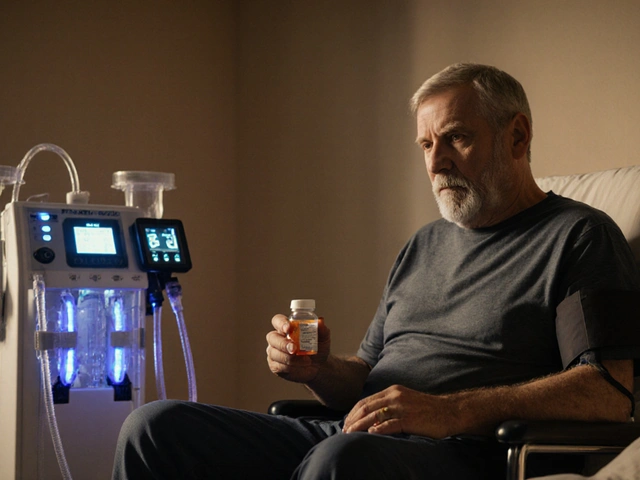Anxiety medication isn’t all about the big names like Xanax or Prozac. There’s a less flashy contender that’s quietly found its place in doctors’ drawers: Buspar. If you’ve never heard of it, you’re probably not alone. Buspar, or buspirone, just doesn’t make headlines like the rest. But it’s a sleeper hit for many people looking for calm without the price of grogginess or dependence.
What is Buspar and Why is it Different?
Buspar came on the scene in the late 1980s, pitched as a non-sedating alternative for those dealing with anxiety. Unlike benzodiazepines—think Valium or Ativan—Buspar doesn’t knock you out or make you feel dull. It’s not the first drug a doctor thinks of when someone’s anxious, but in certain circles, it’s beloved for exactly that reason. For starters, it’s approved by the FDA for generalized anxiety disorder (GAD). Some doctors even reach for it as an add-on therapy when antidepressants alone aren’t cutting it.
The best part for a lot of users? Buspar isn’t habit-forming. You won’t find yourself clawing for it the way people do with benzos. Addiction potential? Basically zero. Some see that as boring, but for others, that’s the gold standard. Your reflexes stay sharp, and you don’t need to worry about withdrawal horror stories. And while Buspar doesn’t provide instant relief (it usually takes two to four weeks to really kick in), that slow climb is often worth it for those wary of getting hooked on stronger stuff.
The science is actually kind of cool. Instead of hitting the brain’s GABA system like benzodiazepines, Buspar tunes your serotonin and dopamine—chemicals that play a major role in mood and worry. If you’ve ever tried SSRIs or SNRIs, you already know the drill. But Buspar is uniquely itself, not quite fitting into any box. That’s why it stands out.
Who Should Consider Buspar?
If you get panicky thinking about dependency, Buspar might actually be a breath of fresh air. It’s tailor-made for folks with long-term, low-key anxiety—think those who always have a baseline hum of worry, but aren’t crashing from panic attacks every week. It likely won’t fix sudden surges of terror; you don’t take it as needed like Xanax. Instead, you take it morning and night, every day, and let it do its slowly-building work.
Doctors often give Buspar a shot for people who have tried SSRI or SNRI antidepressants but don’t love the side effects or want something to take the edge off. It’s especially common for GAD—Generalized Anxiety Disorder—because of its steady, mellow results. Buspar is also popular among people who are sensitive to the “knockout” or fogginess that other anti-anxiety pills can cause. Seriously, you can drive, work, and stay sharp on Buspar. That’s its thing.
Buspar isn’t a cure-all, though. It doesn’t pull double duty for depression, so if you’re struggling with both anxiety and low mood, your doctor might add it to something else. And for those dealing with PTSD or social phobia, the evidence for Buspar is a little shakier. It might help, but don’t expect miracles. Still, some doctors get creative and use it “off-label,” especially if someone is desperate to avoid sedating meds or wants to reduce their dose of stronger stuff.

How to Safely Start and Take Buspar
Starting Buspar isn’t complicated, but you want to do it right. The typical recommendation begins at 7.5 mg twice per day. After about a week, your doctor may bump that up to 10 mg twice a day or even a bit higher, but the maximum recommended dose is 60 mg daily. Everyone’s body reacts a little differently, so staying in touch with your doctor for updates or tweaks is key.
You take Buspar the same time every day, with or without food. Here’s an odd part: if you decide to always take it with food (or always without), stick to that. Switching up how you take it can change how much of the drug your body absorbs. It doesn’t sound like a big deal, but uneven levels can mess with how well Buspar works. People often find the best results come from just building this into their regular morning and evening routine—same way you brush your teeth.
One annoying side note: Buspar isn’t famous for instant relief. It can take anywhere from two weeks to a month before the real benefits kick in. Don’t get discouraged early on if it feels like nothing’s happening. You might experience some mild side effects right when you start—like a bit of dizziness, a headache, or an upset stomach—but those usually fade. Sometimes people notice a weird metallic taste in their mouth. It’s bizarre but harmless. If you ever feel faint, have a rapid heartbeat, sudden mood swings, or anything that feels severe, call your doctor. And whatever you do, don’t mix Buspar with grapefruit juice. Grapefruit messes with the enzymes that break down the drug, and too much can build up fast. It’s an easy thing to forget, but really does matter.
Side Effects and What Users Report
No drug is perfect, and Buspar comes with its own set of quirks. According to a study published in the Journal of Clinical Psychiatry, about 10% of users experience dizziness, while around 6% complain of headaches. The most common side effects are mostly mild and often go away as your body gets used to the medication.
- Dizziness
- Headache
- Nausea
- Lightheadedness
- Nervousness (odd, since it’s for anxiety, but it happens)
- Sometimes insomnia
If you’re on other medications, you need to let your doctor know. Buspar can interact with stuff like MAO inhibitors and certain antibiotics. Mixing meds always calls for extra attention, but with Buspar, it’s a must. For example, people taking antidepressants, blood pressure pills, or even some anti-seizure meds should bring it up with their doctor to play it safe. And again—that grapefruit thing isn’t just a weird rumor; it’s real.
Here’s a table showing how often people report side effects on Buspar, compared to benzodiazepines and SSRIs. These are ballpark figures from clinical trials and user reviews.
| Side Effect | Buspar (Buspirone) | Benzodiazepines | SSRIs |
|---|---|---|---|
| Dizziness | 10% | 5% | 8% |
| Headache | 6% | 2% | 9% |
| Nausea | 8% | 4% | 15% |
| Sleepiness | 2% | 30% | 17% |
| Fatigue | 3% | 15% | 12% |
Real people often say Buspar is “gentle.” There’s no high, so don’t expect euphoria. While that means it might not deliver an overnight transformation, it also means you won’t feel “off” or less like yourself. The lack of withdrawal symptoms is honestly huge for a ton of users who don’t want extra complications down the line.

Tips for Getting the Most Out of Buspar
Staying consistent is the biggest piece of advice for anyone considering Buspar. Take it at the same times every day. Set alarms if you need to—missing doses throws off the steady levels your brain needs. Building a routine makes all the difference.
If you’re nervous about side effects, don’t freak out over a day or two of dizziness or an upset stomach. These usually fade as your body adjusts. Some people find keeping hydrated and eating small meals helps with that rocky first week. And if you get a headache, regular over-the-counter pain relievers are fine, unless your doctor tells you otherwise.
If you’re already taking other anxiety meds, talk openly with your doctor about switching or adding Buspar. Some folks use Buspar together with SSRIs—this is actually a common combo when SSRI benefits aren’t quite enough. Never stop other meds cold turkey, though. If you’re planning to ease off benzos or switch from other anti-anxiety pills, your doctor will probably help you taper safely. It’s not a do-it-yourself project.
If Buspar doesn’t seem to work after four to six weeks, don’t just keep raising the dose on your own. Sometimes, it’s not the right fit—move on and check other options with your provider. Don’t be afraid to ask your doctor lots of questions. What’s your plan for follow-up appointments? What should you watch for? If you’re prone to anxiety about medication itself (yes, it’s a thing), ask for clear timelines and expectations. Bring notes or printouts if you need to.
If sudden anxiety spikes hit while you’re ramping up on Buspar, use music, breathing techniques, or grounding quick-fixes in the meantime. The wait is the hardest part, but backup tricks can get you through rough patches without reaching for as-needed pills.
People sometimes panic about “serotonin syndrome,” but that risk is low with Buspar and even lower if you’re not mixing other serotonin drugs impulsively. Just another reason to keep your provider in the loop about any new supplements or meds.
Before heading to your first Buspar appointment, make a quick list of any herbal remedies or vitamins you take. Some supplements don’t play nicely with anxiety meds, so your provider will want the whole picture.
The takeaway? With the right approach, Buspar can seriously improve quality of life for people who want less anxiety and more normalcy, without the drama of habit-forming pills. Stay patient as it builds up in your system, and always keep the conversation open with your provider. If you’re looking for something Buspar-specific and low maintenance, this med is a solid contender worth considering.




caiden gilbert
June 1, 2025 at 01:37Buspar’s the quiet roommate who never steals your fries but somehow makes the whole apartment feel calmer. I’ve been on it for nine months now - no fog, no crash, no weird withdrawal vibes when I forget a dose. The metallic taste? Yeah, that’s real. Like licking a battery, but only for the first week. Worth it. I drive, code, and even go to loud concerts now without needing a panic exit strategy. It’s not magic, but it’s the closest thing to a chill pill that doesn’t make you a zombie.
Also, grapefruit juice is a hard no. Learned that the hard way. Felt like my brain was doing backflips for three hours. Don’t be me.
phenter mine
June 1, 2025 at 13:35i jsut started buspar last week and im already feelin kinda dizzy but also weirdly calm? like my brain stopped screaming for 5 mins. the doc said 2-4 wks for it to kick in so im tryna be patient. also i keep forgettin to take it at the same time and now im scared its not workin. any tips? i dont wanna be one of those people who stops becuz they got impatient lol
Aditya Singh
June 3, 2025 at 03:08Let’s be honest - Buspar is just a placebo with a pharmacokinetic veneer. The FDA approval is a technicality; the real mechanism is serotonergic modulation via 5-HT1A partial agonism, which, contrary to popular belief, has negligible efficacy over placebo in long-term GAD management beyond 12 weeks, as demonstrated in the 2018 Cochrane meta-analysis. The ‘non-habit-forming’ narrative is marketing fluff - all anxiolytics are non-addictive if they don’t bind to GABA-A receptors. You’re not getting ‘calm,’ you’re getting mild serotonin noise. And let’s not ignore the fact that cognitive behavioral therapy has a 68% response rate compared to Buspar’s 42%. This isn’t a breakthrough - it’s a Band-Aid on a hemorrhage.
Also, grapefruit interaction? That’s not a quirk - it’s CYP3A4 inhibition. Anyone who doesn’t know that shouldn’t be prescribing or taking psychotropics without a PhD in pharmacology.
Katherine Reinarz
June 5, 2025 at 02:25OMG I’M SO GLAD SOMEONE FINALLY TALKED ABOUT BUSPAR BECAUSE I WAS FEELING SO ALONE IN THIS. I WAS ON XANAX FOR 5 YEARS AND MY DOCTOR WAS LIKE ‘YOU NEED TO GET OFF THIS’ AND I WAS CRYING IN THE OFFICE BECAUSE I THOUGHT I WOULDN’T BE ABLE TO FUNCTION. THEN I TRIED BUSPAR AND AT FIRST I WAS LIKE ‘THIS ISN’T DOING ANYTHING’ BUT THEN ONE DAY I WAS WALKING TO THE MAILBOX AND I REALIZED I DIDN’T HAVE A PANIC ATTACK. I JUST… WENT. NO HEART RACING. NO SWEATING. NO ‘I’M GONNA DIE’ THOUGHTS.
AND THE METALLIC TASTE? I THOUGHT I WAS DYING. THEN I READ IT WAS NORMAL AND I WAS LIKE ‘OH THANK GOD I’M NOT CRAZY.’
ALSO I STARTED DRINKING LEMON WATER EVERY MORNING AND IT HELPS WITH THE NAUSEA. I’M SO HAPPY RIGHT NOW I COULD CRY AGAIN. THANK YOU FOR WRITING THIS.
P.S. I’M TELLING EVERYONE I KNOW. BUSPAR IS A GIFT FROM THE ANXIETY GODS.
John Kane
June 5, 2025 at 18:07Hey everyone - just wanted to say how much I appreciate this thread. As someone who’s been in and out of anxiety treatment for over a decade - SSRIs that made me weep uncontrollably, benzos that turned me into a sleepy zombie, and therapy that helped but didn’t fix the biology - Buspar was the first thing that didn’t make me feel like I was trading one problem for five others.
I’m from the Midwest, and we don’t do flashy. We do steady. We do show up. Buspar is the Midwest of anxiety meds - no fireworks, no drama, just quiet, consistent work. I take it with my morning coffee and my evening tea. I don’t think about it. That’s the point.
For anyone feeling discouraged because it’s week three and you’re still dizzy - you’re not failing. Your brain is rewiring. Think of it like planting a tree. You don’t see roots, but they’re growing. I started feeling the shift around week five. Now, I can sit in a crowded room without mentally rehearsing my escape route.
And yes - grapefruit juice is a hard pass. I learned that from my pharmacist in Iowa. She said, ‘If it’s not in your grocery list, don’t let it near your pills.’ Best advice I ever got.
If you’re reading this and you’re scared to start, or you’re doubting whether it’s working - you’re not alone. This isn’t the drug for everyone, but for the right person? It’s the quiet hero they didn’t know they needed. Keep going. You’ve got this.
And if you’re a doctor reading this - thank you. For seeing the quiet ones. For not giving up on the slow ones. For prescribing something that doesn’t come with a warning label that says ‘May cause existential dread.’
Callum Breden
June 6, 2025 at 07:36This is a textbook example of medical mediocrity disguised as innovation. Buspirone has been on the market since 1986. Its efficacy is statistically insignificant compared to SSRIs in double-blind, placebo-controlled trials. The so-called ‘non-sedating’ advantage is negligible - dizziness and lightheadedness occur in 10% of users, which is clinically relevant. The claim that it is ‘non-habit-forming’ is misleading; all drugs alter neurochemistry, and discontinuation syndrome, while less severe than with benzodiazepines, still occurs in up to 18% of long-term users according to the 2020 Journal of Psychopharmacology.
Furthermore, the table comparing side effects is misleadingly curated. It omits sexual dysfunction, which is significantly lower with Buspar than SSRIs, but that’s irrelevant - the core issue is therapeutic inadequacy. Why are we prescribing a drug with a 2–4 week latency period when cognitive behavioral therapy, exercise, and even mindfulness have faster, evidence-based outcomes?
This article reads like a pharmaceutical brochure. It’s not informative - it’s promotional. The tone is dangerously optimistic for a medication with marginal efficacy and no long-term safety data beyond five years. If you’re relying on Buspar to ‘fix’ anxiety, you’re not treating anxiety - you’re treating symptoms while ignoring root causes. This is pharmaceutical band-aid medicine at its worst.